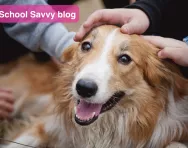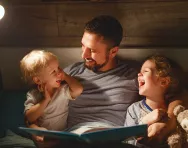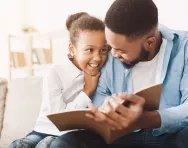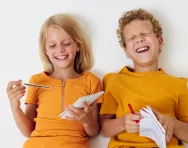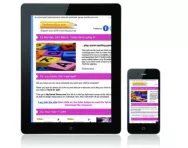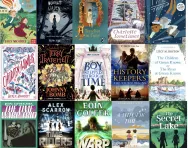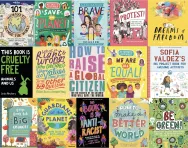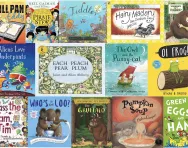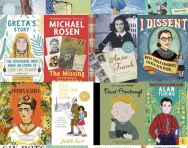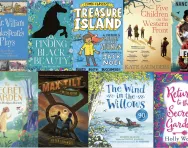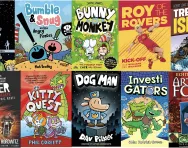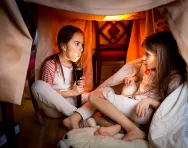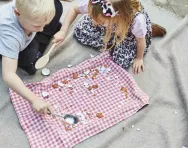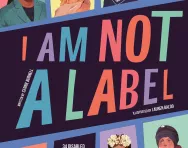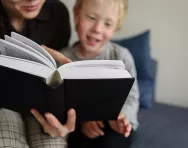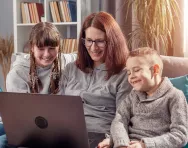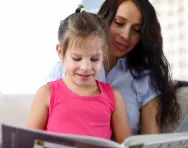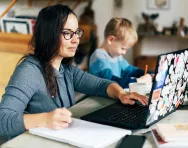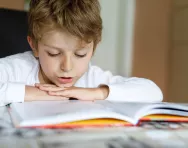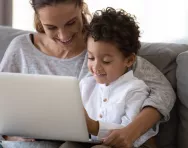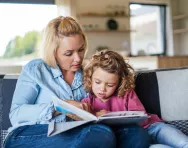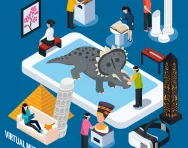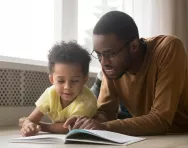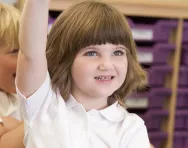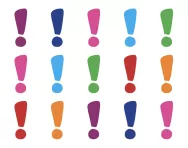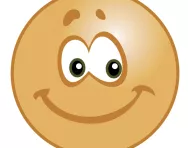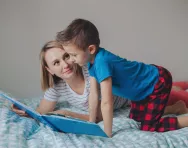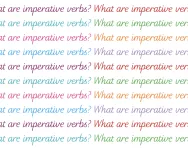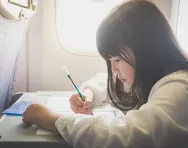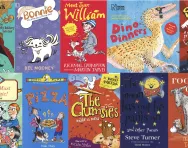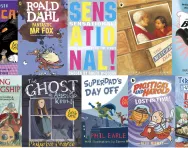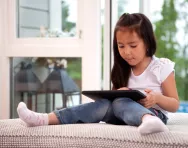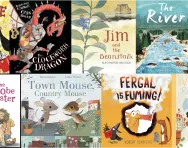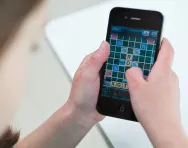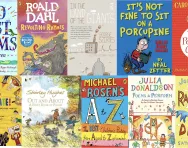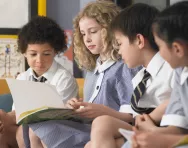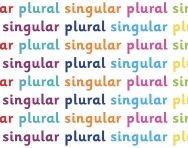Year 2 English articles
Pawsitive changes: Animals transforming schools
Primary school headteacher, Matt Revill, explores the transformative impact of animals in educational settings, addressing key questions such as how dogs assist children in reading, the inspirational value of farm visits and the benefits children derive from therapy pets.
Story time with Dad: best books for bonding & development
In today’s fast-paced world, finding quality time to connect with our children can be a challenge. One of the most enriching ways for father-figures to bond with their kids while fostering their development is through shared reading, so here are our top picks for reading with Dad!
Parents' guide to Phase 6 phonics
Different primary schools use different ways to teach children about sounds and letters, called phonics. But most kids in early years and Key Stage 1 follow a set of steps, or phases, to learn phonics. In Phase 6, they deepen their phonics knowledge and use their skills to help them read and spell. Here, we'll explain what Phase 6 is all about and how you can help your child with it at home.
5 tips on inspiring your funny child to write jokes
Comedy is often an underrated learning tool. It can encourage your child to be creative, express their individuality and help them engage in reading, writing and performance. Encourage your child’s inner comedian with these tips from stand-up comedian, children’s author and comedy writer Steven Vinacour.
24 fun toys for summer outdoor learning
It's well established that outdoor play is important for young learners and provides opportunities to develop physical, social, fine and gross motor skills. Our editor, Kate Morgan, has put together her top picks of outdoor toys. So get the kids outside, having fun and learning this summer. Let the games begin!
How the daily learning programme works
Whether you're taking your child out of school for a period, setting out on your home education journey or simply looking for extra activities to boost your child's learning, here's why the daily learning programme could be the right fit for you...
Best time travel and travel slip books for children
Time travel is a topic that will never cease to captivate kids' imaginations. Ancient Rome, Victorian Britain, where would you time travel to? We've collected some of our favourite time travelling and time slip novels for children that will keep their noses buried in their books and excited for the next chapter. Enjoy!
Best books for budding young activists
Our children's generation have the opportunity to change the world for the better, becoming guardians of our planet and promoting equity and social justice. Help them understand the role they will play in protecting people and environment and show them that every one of us can make a difference with this selection of inspiring, positive kids' books about activism and activists.
Best rhyming books for children
Listening to repeated sounds, rhythms and rhymes offers children clear educational benefits and helps to make them into readers. Best of all, rhyming books are a pleasure to read out loud! Our pick of the best rhyming stories offers a brilliant selection of family favourites that you'll be reciting for years.
Best biographies and autobiographies for children
Biographies and autobiographies bring the lives of influential people to life for young children, highlighting the role exceptional individuals have played in our shared history. Introduce your child to the world's greatest artists, activists, scientists, inventors and humanitarians with books aimed at every age group. Each biography and autobiography is bursting with anecdotes, imagery and information, sure to inspire young people to follow their own dreams and aspirations.
Best story retellings for children
Classic literature is reimagined, updated, revisited and reinterpreted in each of these brilliant retellings, which expand on traditional tales or use comic-strip illustrations or modern settings to make brilliant stories accessible to a new generation of readers.
Best graphic novels for children
In the past children were often discouraged from reading graphic novels because they weren’t seen as ‘real’ books but, in fact, the vocabulary, storylines and humour are highly sophisticated and offer reluctant readers a brilliant introduction to the world of books. Children’s book expert and founder of children’s book review platform Toppsta, Georgina Atwell, picks 10 of the best to capture children’s imagination.
Writing spooky stories: a guide for kids
Can you scare your friends silly with a spooky story? Are you a master of suspense and a lover of all things supernatural? Learn how to keep readers on the edge of their seat with a terrifying tale with writing tips from Phil Hickes, author of the spine-tingling Aveline Jones series for readers aged 9+.
6 literacy and numeracy early learning games
Looking for some quick and easy learning activities to do with your child? In our extract from Five Minute Mum: Time For School, parent and best-selling author Daisy Upton (AKA Five Minute Mum) introduces you to simple, fun five-minute games to support Reception and Key Stage 1 children through their first years at school.
Why children’s books need more disabled representation
Actor, children’s author and former CBeebies presenter Cerrie Burnell shares what it was like growing up with a disability, and why children’s books need more disabled characters.
11 ways to take your child's reading to the next level
Once you’ve encouraged your child's love of stories and boosted their confidence in their reading skills, it’s time to develop those strategies which really make your child ‘a reader’.
Best poetry home education resources
Do you love poetry, or wish you had more time to explore it? Introduce your family to the delights of the spoken word with this selection of wonderful free poetry resources. Classic poems for children, performance poetry videos, interactive poetry games and kids' poetry podcasts: everything you need to encourage a love of verse is available at the click of a button.
Best literacy resources
Whether your child is just learning to read and print letters or looking for ways to put their creative writing skills to the test, we've rounded up some fantastic resources to help them practise phonics, grammar, story-writing and comic-creating at home. Plus there are loads of different ways to connect with authors and listen to stories.
Best kids' activity packs to download
Top up the resource bank and keep the kids busy at home with reading, puzzles, crafting, science and other screen-free activities. They're all available to download for free and you won't need any special equipment, so head off the "I'm bored!" moans and buy yourself a few moments of peace so you can get some of your own work done!
60 reading challenges for primary school kids
Great ideas for keeping your child engaged with reading and broadening their taste in books.
Best YouTube channels for home education
Whether you want your child to learn about maths, geography, science or history, they'll be happy to watch a video about it – and these YouTube channels introduce topics through songs, animations, experiments, skits and riddles. From phonics for new readers to physics for keen scientists, these are the educational channels to subscribe to.
4 things parents need to know about 'reading barriers' and how to overcome them
Learning to read is a complex task and it's common for children to come up against "reading barriers". Parent and teacher Alex Quigley, author of Closing the Reading Gap, suggests ways you can help your child overcome difficulties at home.
Interviewing to write a biography
Writing an in-depth profile of a grandparent or family friend will help your child develop interview skills, learn to write up notes and introduce them to family heritage, stories and legends that they might never have heard! Use our suggested questions to help set up a conversation to remember.
50 of the best virtual trips and educational experiences for families
In this day and age, we may be spending more time indoors but thanks to our laptops and devices we can let the world come to us instead – take a trip round Frida Kahlo’s kitchen, share some chocolate cake with Michael Rosen and journey to the International Space Station with our pick of 50 of the best virtual trips and educational experiences. By Hetty Walton
20 of the best live streams for kids
Help your primary-age child stay educated and entertained with our round-up of the best live streams for kids.
7 key ways to support your Year 2 child's learning
With KS1 SATs on the horizon, not to mention the step up to KS3 at the end of the year, we asked primary-school teacher, education writer and mum of three Phoebe Duffy to highlight the key skills to focus on with your Year 2 child.
What is oracy?
Speaking and listening may not be formally assessed in primary schools, but they’re vital skills for every child. Here’s why – and how to encourage oracy.
What is an exclamation mark?
Understand how to punctuate exclamation sentences and how to communicate sudden and strong emotion in writing with our parents' guide to exclamation marks.
What is a full stop?
Children start learning about punctuation in Reception and Year 1 when they are introduced to full stops and their use. Understand how and when your child learns to use full stops correctly with our parents' punctuation guide.
9 reasons kids struggle with reading – and what you can do about it
Not all children take to books easily. If your child finds reading tricky, read our guide to the problems they might be having.
What are imperative verbs?
Do you know how imperative or "bossy" verbs are used in instruction texts? We explain how children are introduced to imperatives from Year 2 onwards, with examples of how they are taught in the primary classroom.
Best activity books for children
Whether you're on the move or at home, a great activity book offers hours of screen-free learning and fun. Crosswords, maths challenges, mystery solving and code writing are all covered in our best activity books for kids picks. We can't guarantee you won't want to help out with the puzzling, though!
Best books for seven year olds: early readers
Mechanical pirates, hungry dinosaurs, a pair of talking mice, a mischievous group of creatures called the Gigglers and two clever dogs make these books the perfect choice for new readers who are seven.
Best books for six year olds: chapter books
A cunning fox, a haunted room, a terrifying cat, a broken time machine and a princess who fights crime make these short, accessible chapter books perfect for building young readers' confidence.
Best phonics apps for kids
Turn screen time into learning-to-read time and help your child become a phonics whizz with these brilliant tried-and-tested apps for Apple and Android.
Best books for six year olds: independent reading
Lonely rainclouds, tea-drinking dogs, dastardly dragons and grumpy giants make this selection for six year olds the perfect choice for developing readers. The illustrations are wonderful and there isn't too much text, so these books are perfect for a first foray into the world of independent reading.
Best spelling apps for kids
Help your child get to grips with spelling with our round-up of the best spelling apps for primary-school kids.
Best poetry books for children
We could tell you that reading and – even better – learning poetry by heart, will do wonders for your child’s memory, vocabulary and writing. We could tell you that reading and reciting poetry is now a key part of the National Curriculum. Or we could simply say that reading a brilliant poem might give your child a great deal of pleasure. Here are some of the best children’s collections out there, chosen by poet Emma Harding.
Inspiring children to read
When it comes to encouraging children's love of books and reading, teachers (and librarians!) are the experts. We asked Ashley Booth – reader, Year 6 teacher and passionate advocate of children's books – to share his tips for teachers (and for parents!) on igniting a love of reading in primary-school children.
What are singular and plural?
Singular and plural nouns and how they're taught in primary school, plus how KS1 and KS2 children learn about the formation of irregular plurals and how to use possessive apostrophes.
